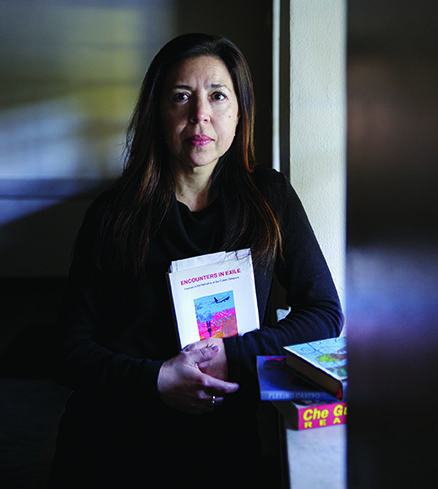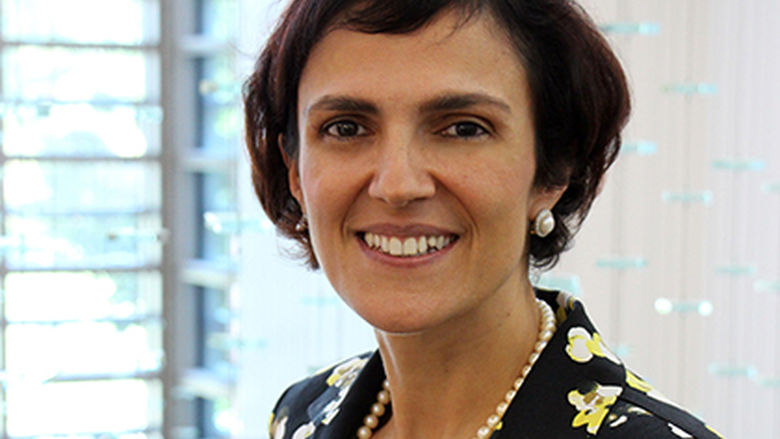READING, Pa. -- For Belén Rodríguez Mourelo, author of "Encounters in Exile: Themes in the Narrative of the Cuban Diaspora," writing about Cuba is personal. The introduction to her book describes her grandfather’s experience in Cuba over a 40-year span, from 1912–1952.
Today, her research focuses on Cuban writing in exile. She explains that her research has been evolving from the very beginning, starting with a doctoral dissertation on African-American literature that transformed into study of Afro Hispanic writing, moving on to Afro Cuban writing, and finally, focusing on Cuban writing in exile.
But the main point of all her research is the search for identity as it is presented in autobiographies and biographical fiction.
Rodríguez-Mourelo focuses on writers who left Cuba in the 1990s as part of what is referred to as the “special period in times of peace.” She explains that during this decade, after the fall of the Berlin Wall, the Soviet Union stopped sending economic support to Cuba. This resulted in an economic crisis, which was reflected in a lack of resources, paired with a tense political atmosphere, resulting in many people emigrating from the island. Some left to live with family elsewhere, while others became political refugees. After studying the themes of many writers who left Cuba during this period, Rodríguez-Mourelo published "Encounters in Exile."
Currently, she is focusing on three writers who left Cuba in the 1990s: Pablo Medina, Zoé Valdés and Daniel Iglesias Kennedy. She explains that she chose Medina not only because of the quality of his writing, but also because he resides in the United States and she could easily understand his environmental context. She chose Iglesias Kennedy because he resides in her native Spain, so she could understand the way he is settling in the Spanish culture and what aspects of that culture he is adopting in his writing. Finally, she chose Valdés, who resides in France, because she is a female author who is very prolific.
In fact, she has written an article that has just been accepted for publication arguing that Medina’s writing has evolved from an exilic imagination to an identity she calls more post national -- more plural, global and in tune with universal themes, and traces Medina´s work from his "Exiled Memories: A Cuban Childhood," 1991 to "Cubob City Blues" in 2012.
She also explains that Iglesias Kennedy has never been a traditional writer in that he has never shown nostalgia in his writing, but now he has adopted the Spanish culture and literary tradition into his style, as evidenced in his novel, "El Marmitón Apacible" (2006) written in the picaresque genre. Meanwhile, Valdés has published many books but the ones that refer to exile reveal continuity in the way that she reflects on what it means to become an exile ("La Nada Cotidiana," 1995), and her writing has evolved into a more aggressive and combative statement ("El Todo Cotidiano," 2010).
Rodríguez-Mourelo plans to take her research to the next level by focusing on the “Operation Pedro Pan,” in which Cuban parents, fearing indoctrination and that the Cuban government would take away their parental authority, sent their children to the United States. From 1960–1962, more than 14,000 Cuban youths arrived alone in the country in the largest recorded exodus of unaccompanied minors in the Western Hemisphere. She plans to analyze the works of Carlos Eire, a writer and professor in the United States, who was 11-years-old when he was sent to the United States and has written on his experiences. She also plans to compare similar experiences around the world, such as when children in Spain were sent to Russia during Franco’s regime.
For Rodríguez-Mourelo, her relationship with Cuba has come full circle. In 2013, she was asked to chaperone a Penn State Alumni Association trip to Cuba. In an article that she wrote for the Blue and White alumni magazine on the trip, she stated, “With thoughts of my grandfather, my husband next to me, and the company of 32 alumni, I had been asked to be the Penn State host during this journey that revealed the people, the land, and the culture of Cuba, and that made all of us fall in love with each corner of the island.”
Rodriguez Mourelo is head of the Division of Humanities, Arts and Social Sciences and associate professor of Spanish at Penn State Berks.


